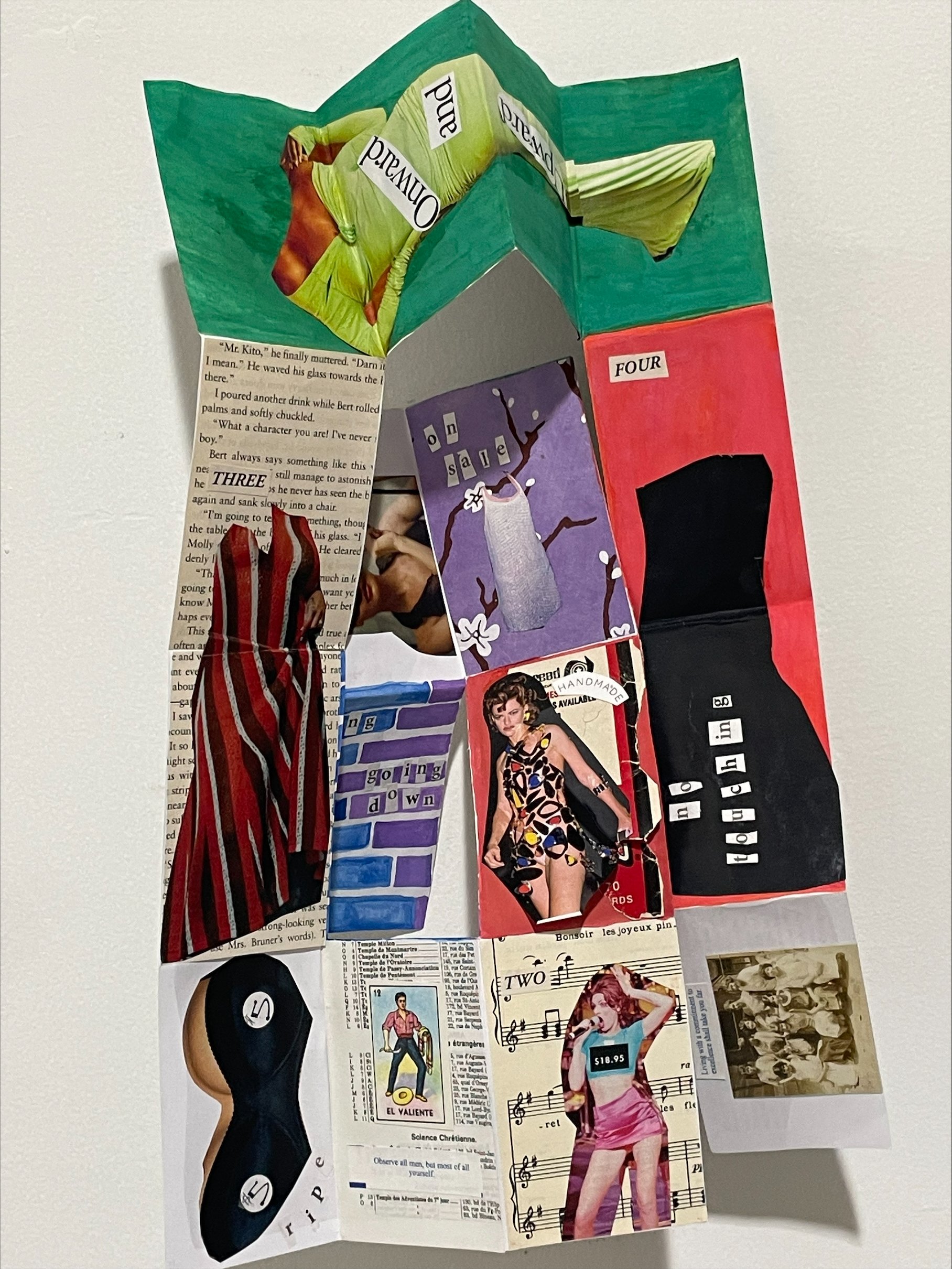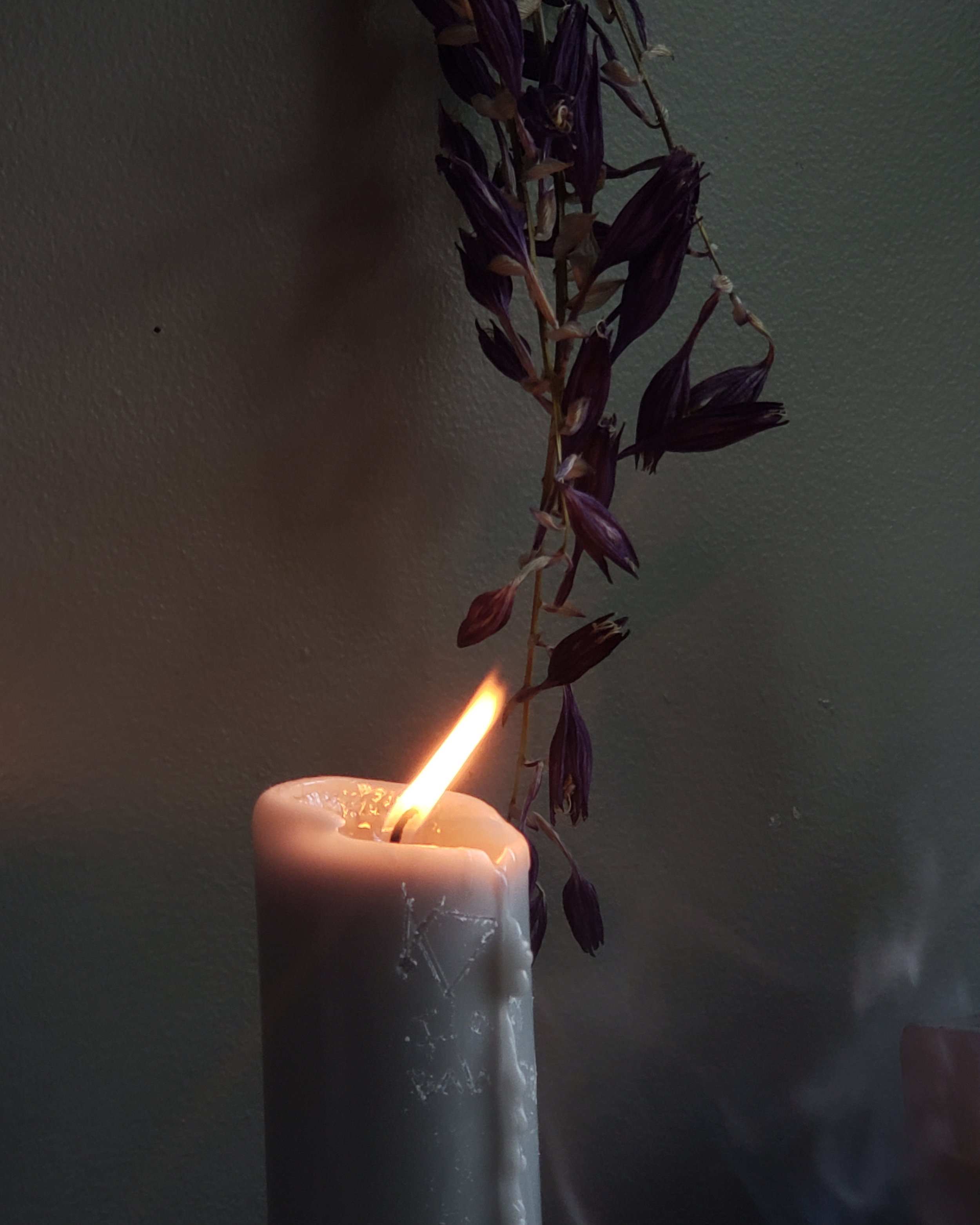
Issue 35.2
Editor’s Note
To the Washington College community—
It feels, in some ways, like we are almost always entering into or stepping away from a semester. I’ve met the midway point of an academic year four times here at the College, and still I find it jarring to be so surrounded by this ever-steady movement away from the beginning. Of course, no matter how disconcerting, this forward motion is unpreventable. Here we are now, at December — I hope these months have been something other than heavy for you all.
Heaviness, though, is a restless, frequently indefinable thing. I’ve spent quite a bit of time lately wondering if it isn’t so terrible to allow ourselves to sit with it and reach out to it when it visits us. These year-ends are billowing, and they tend to beg us for a degree of reflection we aren’t always eager to practice. This is a time of shifting and moving ahead, true, but also of turning around to face our losses and contend with our nostalgias — even the melodramatic ones. That is a challenging undertaking to embrace, but it is possible that ease should never be our sole ambition to begin with. Vulnerability is the root of our best dialogue, and it only wakes up when that which is troubling is allowed to intermingle with that which is soft.
Collegian 35.2 is colored by that bittersweet merging. Here you will meet with your grief and your sentimentality, shake their hands, invite them into your home for awhile. Rather than turn away from these sensations, it is my sincere hope that you will grant yourself a pause to lean into them.
Our contributors this time around have each taken on that aforementioned vulnerability with enviable solidity. Unwavering in their respective marriages to introspection, the pieces we have to share with you in this issue are all at once disarming and anchoring. As you wind your way through them, please try to be gentle with yourselves and unflinching in your commitment to your own vulnerabilities — whatever that looks like for you.
Be good to one another,
Sophie Foster
Editor in Chief
Table of Contents
House on the Hill by Ella Humphreys (header image)
“rivers ever-becoming” by Savannah Nies
$10 by Riley Dauber
“From the Judas Tree” by Connor Cordwell
I Haven’t Left (fate unfinished) by Ella Humphreys
“Reunion” by Grace Hogsten
“Implosion of a Titan” by Jaya S. Basu
A Witch’s Blessing by Ella Humphreys
“Grief’s Reprise” by Rae Merson
O Gus! My Spirit Pass’d Before Ye by Arianna Jahangir
“A Conversation Between Me and My Stone Paper Notebook on a Roadside Farm” by Dante Chavez
by Savannah Nies
rivers ever-becoming
softly floating, colorful light
and darkness all at once.
what am I. (exactly.)
clothes do not cover me,
“my” “body,”
how would you go about
concealing infinity? shapeless space
tangible and nonphysical—
still myself.
“you can never step into the same
river
twice”
and you know that we
are all rivers too— pivoting, slipping,
kicking up silt where we go and
taking it with us,
as us—
these leaves that fall into our waters are swept up, too.
rivers are metamorphosis embodied and unending, despite.
rivers pooled, trapped, into ponds
kill all of their movement,
what do you do every day
to avoid becoming a pond?
choked with cool mud, tasting earth
and physicality,
nature’s purpose is growth—
so nature, through humanity, experiences itself, then?
you are never what you think (you are)
at any one moment,
don’t
be
afraid;
to forever turn is to be the river,
to “know” is to be the pond.
*Quote from Greek philosopher Heraclitus
$10 by Riley Dauber
by Connor Cordwell
From the Judas Tree
I can see them hanging in the corners of my eyes —
Apostles of grievances
that have not been voiced.
Reddened garden
emptied of meaning, Iscariot,
whose soul is worth the price they paid you?
Does that reward
not get heavier by the pound?
Can’t you
feel the gray matter seeping out
from behind this crown
of thorns?
Judas’ tree,
you sit, innocent,
in this pinkened plain.
Judas tree,
reveal to me
the truths
of my uncertainty.
Judas,
you loved
once,
didn’t you?
You were loved.
I Haven’t Left (fate unfinished) by Ella Humphreys
by Grace Hogsten
Reunion
My grandmother and I are sitting at the table talking and laughing. She’s so witty and funny, just like everyone said she was. As she laughs, her eyes squint behind her wire-framed glasses. Her face is flushed, contrasting against her snow-white hair, which is soft and curly, just like mine and my dad’s.
Sitting here with her is the easiest thing in the world. Everything is warm and bright. Everyone in the family is gathered around, some sitting with us, and others idly drifting around the room, simply happy to be in her presence.
For a moment, everything seems perfect.
Then, my stomach starts to sink and I feel my heart beat a little faster as unwanted reminders of reality try to tiptoe into the forefront of my mind. I feel a pressure on my chest, but I keep still, looking at her and listening.
I remember my grandmother wishing us a happy Valentine’s Day in a soft, shaky voice. Her words were barely comprehensible, yet controlled and steeped in persistence. I remember how we all gasped with joy and exclaimed at how clearly she’d spoken, how we hadn’t heard her speak so clearly in years.
I remember the cane she started carrying before my brother was born. I remember the ramp my grandfather built so he could wheel her onto their porch. I remember listening intently to her shaky voice at the dinner table, straining to understand something, anything, but never quite succeeding.
I know that, though she is before me now, she cannot stay here forever.
So I sit, basking in her presence like a cat stretched out in the sun. I want to store up the feeling of being with her so that I’ll have something to sustain me when she’s gone. I know that once I leave the room, so will she.
After it feels like scarcely any time has passed, I know our time is up. I don’t want to leave her, but my body moves of its own accord. I feel myself stand up from the table and walk out of the room.
I turn around and step back into the doorway to take one more look even though I know what I’ll see.
My body feels heavy.
The room is no longer bustling and filled with chatter. I stand alone, staring at the table.
Finally, I turn away and see my grandfather, my grandmother’s husband of 50 years and widower of 10. I give him an imploring look with eyes full of tears, begging for comfort from the person I know is hurting the most.
“It’s okay,” he says. “We’ll see her again.”
I open my eyes, see the bedroom ceiling above me, and cry.
by Jaya S. Basu
Implosion of a Titan
We now believe that our CEO Stockton Rush, Shahzada Dawood and his son Suleman Dawood, Hamish Harding, and Paul-Henri Nargeolet, have sadly been lost.
OceanGate official statement, 2023
We will never outlive the Greek chorus,
though their chitons wear and wither
like a ship’s molding sails,
falling to kiss the rotting wood
that was once her ribcage.
We will take up their masks
and sing
even if we slip down wood-sheathed steel
into frigid blue waters;
even if we are staked by splinters of
duplicitous cedar on the way
still we must sing.
The ladies waved their handkerchiefs,
and gents doffed their caps,
tiny flags of surrender against a pier made of impuissance
perched on the cerulean sea, a
swirling cocktail of lust and leviathan.
The dock workers wiped the sweat from their brows
and prayed for Krakens and storms and icebergs
but mostly for dinner.
.
There’s no room for steak dinners or first class bedrooms
for a ticket twice as heavy.
There are no dogs or Spanish gentry
for a death sentence twice as long.
No new skeletons will sink to the sea floor
keeping their grandparents company.
No new coral reefs will sprout through the eyeholes
of mollusk-dotted skulls.
When bones are ground to dust
they’re indistinguishable from sand.
Dust that has loved and trembled
cannot be told apart from the dust of fool’s gold.
At least there’s no room for musicians.
.
The sea, hungry,
eats what we cannot.
She feeds
indiscriminately
on pig and sheep and steel.
We are drawn to the seafloor,
the rough abalone of her sternum,
whether it’s paved with titanium or lone and level sands.
The wreckage calls out like a wrought iron siren,
beckoning with the sprawling mildewed trunks
that were once lovely white arms,
and singing a long-drowned melody.
Shrapnel on the seafloor all glitters the same silver.
A Witch’s Blessing by Ella Humphreys
by Rae Merson
Grief’s Reprise
Grief haunts my parents' house.
No, that’s wrong. It is their house now, but it used to be hers. My grandmother’s. It used to be an Oasis and Sanctuary and Holiday Home. It used to be the House Behind Mine, where I would find life and joy in the smog of cigarettes. It used to be where we could all sense the love wrapping itself deep in our bones.
But then sickness infected it.
It infected two people that shaped my entire being and burrowed into them so deeply that we couldn’t save them. But by gods and universes and whatever else you can believe in did we try. We tried for years and tried through pain and tried even when trying would spit venom back at us. We thought we could make it. We thought healing and hope would win.
But then my grandfather died. And the sickness never left my grandmother.
Sickness and Grief chased us over the years. Through every decision, every appointment, every fight, every day. We thought we had failed once before and we couldn’t fail again. Memories of my grandfather hurt, and none of us wanted to accept the pain. We pushed on—through every decision, every appointment, every fight, every day.
We couldn’t save my grandfather, but, if we kept pushing, we thought we could save her. If we outran sickness, it wouldn’t catch us. We were wrong.
She died. And the sickness left stains.
Now my parents reshape the home, trying to make it ours. I feel the memories tapping against the framework, begging to be let in. Letting them in used to hurt. They used to pull and tear and rip and maim. But they have calmed now. Perhaps my parents’ remodeling has tamed them.
And I am no fool. I know the ache will never leave. I know that, despite our best efforts, a wild animal will never fully be domesticated. My Grief will have its moments of feral monstrosity—but it can also bring me peace.
I see the flap of butterfly wings and Grief reminds me of her. I see a wheelchair and Grief aches with the memories of a grandfather long gone. So many things remind me of them.
Hospital rooms and nursing homes—feeding tubes and wounds—missing thoughts and emotional fights—laughing and smiling—pierogies and cabbage—Christmas and Spring—lipstick and D.C.—Elvis and John Wayne—our house.
These are the things Grief keeps with me. It is a beast that never forgets, and I do not wish for it to. It lays with me and growls with me and howls at all my suffering. And when I reminisce in my grandmother’s kitchen at my parents' table in our patchwork house, I can hold Grief fondly. Gently.
Grief does not haunt my parents’ house. It just keeps us company.
O Gus! My Spirit Pass’d Before Ye by Arianna Jahangir
by Dante Chavez
A Conversation Between Me and My Stone Paper Notebook on a Roadside Farm
Can’t we just stay here
under this tree for a little longer?
Retreat from that relentless world
in Chestertown’s panic room,
just a few miles from campus?
Couldn’t we just collapse and
weep beneath this willow forever
or at least, until our tears drain
then dissolve us then
water this pond beyond us?
What if we stayed here
and buried ourselves under the dirt?
Let the ticks and mosquitoes buzz over, burrow under our skin
explore our bodies to their tiny stomachs’ content
or stuck ourselves up in that tree
strings attached to both our shoulders
like retired marionettes
let the crows take turns pecking at the spines,
barely holding us together,
or maybe to our ankles
so they can shake us for everything we’re worth?
Would it really be so bad to stay here
and wait for this world to take us in?
Let it sink its fangs in again like a fevered lover
of our blood, our entrails, all our contents
leaking out, eventualizing our final feast
for this world to devour
or maybe just take a dip in this perfect still pond,
never come out again, hand ourselves over
to the bacteria to burp out when they finish with us?
We can sync our final bubbling croaks up with the frogs!
Maybe then we could finally be just as silent as this moment…
Why can’t we just shut up and end here?
Haven’t we written enough of our story?
The constant inconstancy of that world,
it gets to you too after a while,
doesn’t it?
Or is it the other way around?
Do you get a hang of the ride after a while
Only for it to buck you off your high horse
like a jealous rival jockeying for reposition?
Aren’t we tired
of trying to figure that out?
Wouldn’t it just be easier to
let this world break us apart already?
Can’t we just stay?
No, we can’t
because even now, it creeps back in
the relentless world, my world
This is someone else’s farm
I have to leave eventually
My car is low on gas
I need to refill my tank
My phone is dying
I’m going to charge it now
Even you, phony you,
you have to admit you’re not as fragile as you think you are;
it’s not up to you to decide how we come undone.
I have to go back because
the world might be out for our blood but
it’s my job to decide how much we bleed for it.




